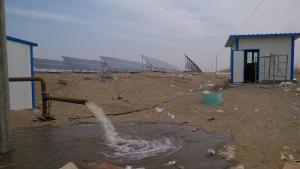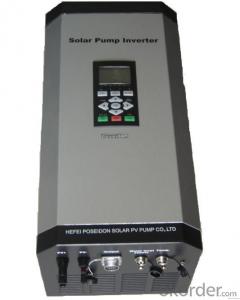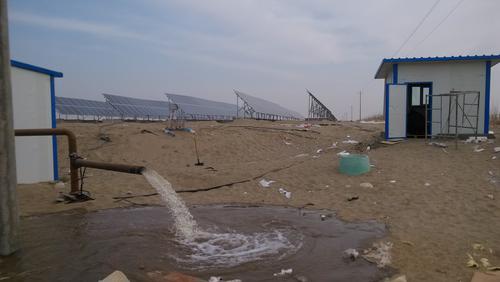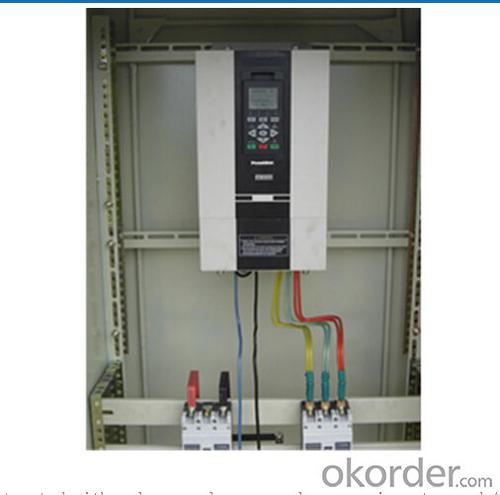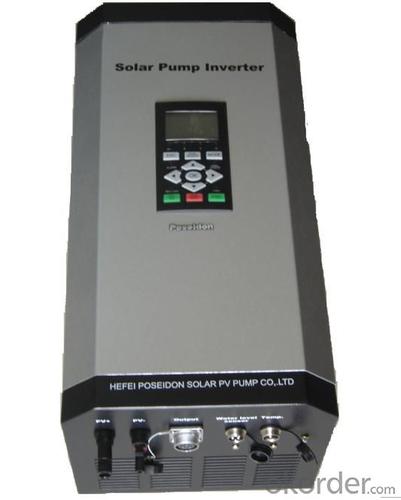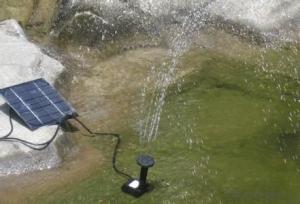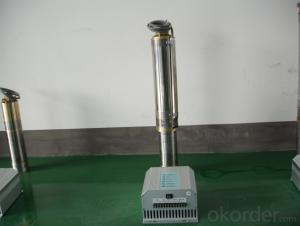Smart Solar Pump FCPM110KH Inverter
- Loading Port:
- China Main Port
- Payment Terms:
- TT OR LC
- Min Order Qty:
- -
- Supply Capability:
- -
OKorder Service Pledge
Quality Product, Order Online Tracking, Timely Delivery
OKorder Financial Service
Credit Rating, Credit Services, Credit Purchasing
You Might Also Like
Solar pump inverter FCPM110KH Product Description:
Solar water pumping system is constructed with solar panel array,solar pump inverter and AC water pump, DC current produced from solar panel will be delivered to solar pump inverter,and it will convert it into AC current to drive water pump,and will automatically regulate output frequency according to sun radiance intensity,maximally realize MPPT tracking function.
Features
Adopting the proposed dynamic VI maximum power point tracking (MPPT) control method, with fast response, and reliable operation, achieves efficiency of 99%.
Designed with variable frequency driver, greatly improves efficiency
Extremely high efficiency
Digital mode control, with automatic operation and manual operation mode options
Complete protection functions
Adopts intelligent IPM module, with high reliability
LCD display and operation panel, in real time presents operating data
Optional for water level measurement and control circuit
Applicable for general ACC pumps, like centrifugal pump, piston pump etc.
Independent intellectual property; Highly effective, the redundant reliability, exempts the maintenance and the long life.
The pumps are soft started, fully protected.
No batteries are used. So better Sunlight, more water.
Datasheet.
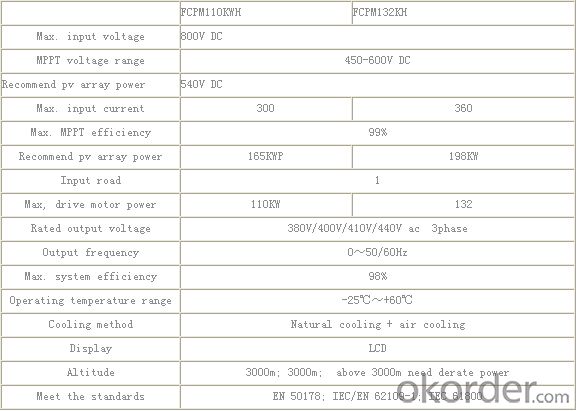
- Q: How does a solar pump handle water source contamination from nearby industries?
- A solar pump alone cannot handle water source contamination from nearby industries. However, it can be equipped with additional filtration systems or paired with other water treatment methods to address the issue of contamination and ensure the water quality meets the required standards.
- Q: How does the performance of a solar pump vary with different pumping distances?
- The performance of a solar pump can change depending on the distance it needs to pump. When the pumping distance increases, the solar pump's performance may decrease due to various factors. One of the main factors that affects a solar pump's performance at different pumping distances is the vertical distance or head height that the water needs to be lifted. The higher the head height, the more energy the pump needs to lift the water, which can result in reduced performance. Solar pumps have a maximum head height they can reach, and exceeding this limit can lead to a decrease in flow rate and efficiency. Moreover, the distance between the pump and the water source can also impact its performance. As the pumping distance increases, there can be friction losses in the pipes, which can cause a decline in performance. The longer the distance, the more significant these friction losses become, resulting in reduced flow rate and efficiency. Furthermore, the size and capacity of the solar pump also contribute to the variation in performance. Different pumps have different power ratings and flow rates. It is crucial to choose a pump that can efficiently handle the required flow rate and head height when selecting a solar pump for a specific pumping distance. It is essential to consider that the performance of a solar pump can also be affected by other factors such as the quality and condition of the solar panels, the amount of sunlight available, and the overall system design. Therefore, it is recommended to consult with a solar pump expert or supplier to determine the most suitable pump for a specific pumping distance, ensuring optimal performance.
- Q: Can a solar pump be used for water supply in remote wildlife reserves?
- Yes, a solar pump can be used for water supply in remote wildlife reserves. Solar pumps are an excellent solution for remote areas as they rely on solar energy to operate, eliminating the need for electricity or fuel. They are environmentally friendly, cost-effective, and can provide a reliable water supply for wildlife in these remote locations.
- Q: How does the efficiency of a solar pump vary with different water temperatures?
- The efficiency of a solar pump typically decreases with higher water temperatures. This is because as the water temperature rises, the solar panels that power the pump become less efficient at converting sunlight into electricity. Additionally, higher water temperatures can lead to increased friction and resistance in the pump system, reducing overall efficiency.
- Q: Can a solar pump be used for water supply in horticulture farms?
- Yes, a solar pump can definitely be used for water supply in horticulture farms. Solar pumps are an environmentally friendly and cost-effective solution for irrigation purposes in agriculture. They harness solar energy to power the pump, eliminating the need for electricity or fuel. This makes them suitable for remote locations and farms with limited access to grid power. Solar pumps can efficiently provide water for irrigation, ensuring the optimal growth and health of plants in horticulture farms.
- Q: What is the expected efficiency of a solar pump system in converting solar energy to mechanical energy?
- The expected efficiency of a solar pump system in converting solar energy to mechanical energy can vary depending on various factors such as the type and quality of the solar panels, the design and efficiency of the pump system, and the environmental conditions in which the system operates. On average, a well-designed solar pump system can have an efficiency range of 20% to 40%. This means that it can convert 20% to 40% of the solar energy it receives into mechanical energy to power the pump. However, it is important to note that these figures are approximate and can vary depending on the specific system components and operating conditions. Efficiency can be improved by selecting high-quality solar panels with higher conversion efficiencies, ensuring proper system design and installation, and using energy-efficient pumps. Additionally, optimizing the system for maximum solar exposure, reducing energy losses due to wiring and connections, and regularly cleaning and maintaining the solar panels can also enhance the overall efficiency of the system. It is worth mentioning that solar pump systems are typically more efficient when used for low-pressure applications such as irrigation and water supply, as the energy requirements are relatively lower compared to high-pressure applications like pumping water to higher elevations. Overall, while the expected efficiency of a solar pump system can vary, with proper attention to system design, component selection, and maintenance, it is possible to achieve a satisfactory level of efficiency in converting solar energy to mechanical energy.
- Q: Can a solar pump be used for irrigation in greenhouses?
- Yes, a solar pump can be used for irrigation in greenhouses. Solar pumps are a sustainable and cost-effective solution for greenhouse irrigation as they utilize solar energy to power the pump, eliminating the need for electricity or fuel. This makes them suitable for remote locations or areas with limited access to electricity. Additionally, solar pumps can be easily integrated into existing irrigation systems, providing a reliable and environmentally friendly method to deliver water to greenhouse crops.
- Q: What is the expected impact of shading on the performance of a solar pump?
- The expected impact of shading on the performance of a solar pump is a reduction in its efficiency and output. Shading can block sunlight from reaching the solar panels, which provide the energy to power the pump. As a result, the pump may not receive enough energy to function optimally, leading to decreased water pumping capacity. It is important to minimize shading to maximize the performance of a solar pump.
- Q: How do solar pumps compare to diesel or electric pumps in terms of efficiency?
- Solar pumps are highly efficient compared to diesel or electric pumps. Solar pumps utilize energy from the sun, making them cost-effective and environmentally friendly. They have lower operating costs, as they do not require fuel or electricity from the grid. Additionally, solar pumps have a longer lifespan and require less maintenance, resulting in higher overall efficiency.
- Q: Can a solar pump be used for sewage or wastewater treatment?
- Yes, a solar pump can be used for sewage or wastewater treatment. Solar pumps are commonly used in wastewater treatment systems to circulate and transfer sewage or wastewater. They are efficient, cost-effective, and environmentally friendly as they rely on solar energy to operate, reducing the need for electricity or fuel. Additionally, solar pumps can be easily integrated into existing sewage or wastewater treatment plants, providing a sustainable solution for water management.
Send your message to us
Smart Solar Pump FCPM110KH Inverter
- Loading Port:
- China Main Port
- Payment Terms:
- TT OR LC
- Min Order Qty:
- -
- Supply Capability:
- -
OKorder Service Pledge
Quality Product, Order Online Tracking, Timely Delivery
OKorder Financial Service
Credit Rating, Credit Services, Credit Purchasing
Similar products
Hot products
Hot Searches
Related keywords
